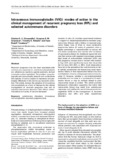| dc.contributor.author | Omwandho, CO | |
| dc.contributor.author | Gruessner, SE | |
| dc.contributor.author | Roberts, TK | |
| dc.contributor.author | Tinneberg, HR | |
| dc.date.accessioned | 2013-04-24T09:38:37Z | |
| dc.date.available | 2013-04-24T09:38:37Z | |
| dc.date.issued | 2004 | |
| dc.identifier.citation | Clin Chem Lab Med. 2004 Apr;42(4):359-70 | en |
| dc.identifier.uri | http://hinari-gw.who.int/whalecomwww.ncbi.nlm.nih.gov/whalecom0/pubmed/15147144 | |
| dc.identifier.uri | http://erepository.uonbi.ac.ke:8080/xmlui/handle/123456789/16560 | |
| dc.description.abstract | Recurrent pregnancy loss has been associated with autoimmune responses to membrane phospholipids and alloimmune reactions against paternally derived molecules on the trophoblast. The problem is psychologically and economically stressful as it undermines the capacity of some couples to reproduce and participate effectively in the day-to-day economic activities. This article reviews the adoption of intravenous immunoglobulin as a form of therapy for the clinical management of recurrent pregnancy loss and of selected autoimmune disorders. Side effects, contraindications and safety of use are discussed | en |
| dc.language.iso | en | en |
| dc.title | Intravenous immunoglobulin (IVIG): modes of action in the clinical management of recurrent pregnancy loss (RPL) and selected autoimmune disorders | en |
| dc.type | Article | en |
| local.publisher | Department of Biochemistry, University of Nairobi, Nairobi, Kenya | en |

